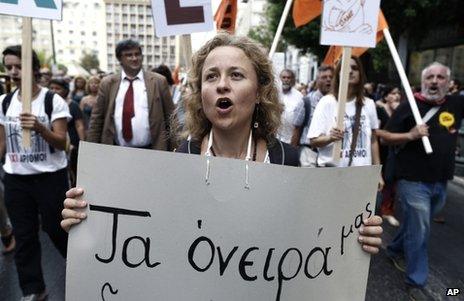Crisis in Greece: PM Samaras sees recovery by 2019
- Published

Teachers are protesting against public sector cuts
Greek Prime Minister Antonis Samaras has said the debt-ridden country could return to pre-crisis living standards within six years.
"According to most [experts], we will not need a couple of decades, not a couple of generations, but only six years," he said in a .
He spoke in Rome before travelling to Brussels to meet EU officials.
International lenders are due to conduct a new audit of Greece, where strikes against cuts are under way.
Doctors began a three-day strike on Tuesday in protest at government plans for hospital mergers.
Teachers went on strike on Monday with thousands attending rallies outside parliament in the capital, Athens, as well as the second city, Thessaloniki.
Greece's economy has shrunk by 23% since 2008, and international lenders expect it to diminish by a further 4.2% this year.
The country has received two aid packages totalling about 240bn euros (拢205bn; $321bn) and will need about 10bn euros more to cover a funding gap.
In rare good news for the economy, a finance ministry official told Reuters news agency the government expected its budget gap over 2015 and 2016 to be "well below" 2% of GDP thanks to a strong tourism season this year.
New money
Speaking at a conference organised by the International Herald Tribune, Mr Samaras said his government had implemented "sweeping reforms" and the country was now "going through the end of the recession".
Mr Samaras (left) met the head of the European Commission in Brussels
In Brussels, he met European Commission President Jose Manuel Barroso who said in a after the talks: "I believe now we can say there is light at the end of the tunnel."
However, Mr Barroso added, there was "still a way to go to modernise the public sector and really put it at the service of citizens and companies".
Mr Samaras, who leads a fragile coalition between his conservative New Democracy party and leftist parties, has agreed to put 25,000 civil servants on a reduced salary this year before they are transferred or dismissed.
The action is being taken in exchange for a new instalment of loans worth 1bn euros from the so-called troika of lenders - the European Commission, the European Central Bank and the International Monetary Fund.
It is the first time under the Greek constitution that public sector workers will lose their jobs, with 15,000 redundancies expected by the end of 2014, the 大象传媒'S Mark Lowen in Athens reports.
Some 4,500 civil servants - mostly teaching staff - were already redeployed at the end of July.
A technical team from the troika is due to arrive in Athens this week, followed by senior mission chiefs on 22 September, AFP news agency reports.
They are expected to examine the privatisation of three ailing industries - mining company Larko, truck manufacturer Elvo and defence contractor EAS - and the drafting of a new property tax.
'Impossible to live'
When protesting school guards tried to push their way into the ministry of administrative reform on Monday, police fired tear gas.
"We want our jobs back!" former school guard Eleni Stathaki, 53, told Reuters news agency, weeping. "They threw us out but want us to keep paying taxes. It's impossible to live like this."
As protesters marched through Athens to parliament, they chanted "Let's kick the government, the EU and the IMF out!" and held banners reading "No firings!"
A two-day general strike by public sector workers is due to begin on Wednesday.
Greece insists that its notoriously inefficient and bloated public sector needs reform, our correspondent says.
But with unemployment nearing 30%, it is a hard argument to sell to the people, he adds.